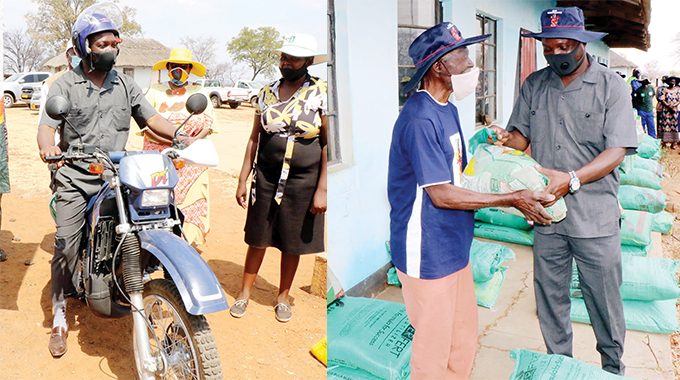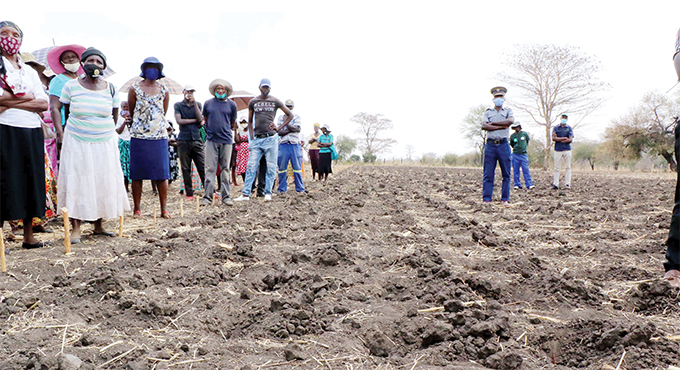
Thandeka Moyo-Ndlovu, Chronicle Reporter
THE climate-proofed Presidential Input Scheme was launched yesterday in Matabeleland North Province with farmers expected to receive 60 000 tonnes of maize seed and other seeds this farming season.
Inputs to be received under the Intwasa/Pfumvudza farming concept, that is popularly known as gatshompo in the Matabeleland region, include cow peas, groundnuts, cotton seeds as well as fertiliser and chemicals to help farmers yield enough produce to tackle food insecurity in Zimbabwe.
Under the programme, each household will receive a standardised input package of 5kg seed, 50kg basal and 50kg top dressing fertiliser and these communal farmers will be expected to practice Intswasa/Pfumvudza.
Government adopted Intwasa/Pfumvudza to address the problem of low production and productivity which continued to negatively affect food security in Zimbabwe.
The concept promotes climate proofing agriculture by adopting conservation farming techniques and it involves the utilisation of small pieces of land and application of the correct agronomic practices for higher returns.

One of the plots that have been prepared for the gatshompo farming method
Statistics show that more than 8,6 million Zimbabweans are food insecure and the situation has been worsened by the Covid-19 pandemic whose impact disrupted many economic activities.
Speaking during the programme’s provincial launch at Chithekani Primary School in Insuza yesterday, Matabeleland North Provincial Affairs Minister Richard Moyo said the inputs would be availed to anyone who meets the requirements for the intwasa farming concept.
These requirements include land preparation and division so that households are able to produce food for consumption and for Grain Marketing Board reserves.
Minister Moyo said the province was expected to deliver 600 tonnes of maize to the GMB compared to 60 tonnes last year.
“The climate-proofed Presidential Input Scheme is a program aimed at supporting vulnerable households to produce maize and grains to improve food security in households and ultimately in the country. We are grateful for these inputs and I believe that rightly used these will save us thousands of forex we use to import maize due to food insecurity. With gatshompo, I know everyone will be able to produce enough grain for the family and for our reserves in case we have another drought next year,” said Minister Moyo.
“As we are aware that our economy is agro-based, agriculture has therefore been targeted as the sector that will lead to the recovery of our economy. As we strive to improve agricultural productions, let us make maximum use of land as this is critical for the success of the land reform programme.”
According to Minister Moyo, each household will receive a standard input package of 5kg seed, 50kg basal and 50kg top dressing fertiliser as well as fall armyworm chemicals.
“I urge farmers to diversify to increase production and produce cops like groundnuts, cow peas, vegetables and cash crops such as cotton or food that can be consumed by both humans and animals. As such, the Presidential Input Scheme saw it fit to include seed for groundnuts, cow peas, cotton and vegetables. It is also important that farmers reinvest their profit into agriculture to complement these efforts,” he said.
One of the seed beneficiaries Ms Fidelia Nyoni said she hopes using the new concept would yield her more produce compared to previous years.
“I live off farming and have often struggled when there are droughts or erratic rainfall patterns. My fields are ready now and with these inputs and the guidance of the agricultural extension officers, I can confidently say I will produce more than six tonnes of maize,” she said.
Ms Nyoni said she has previously planted millet and sorghum which sustained her even during this year where many households are facing food shortages.
“This year was tough and many households did not have access to food since we did not do well during the past farming season. However, we have now been empowered to do things differently so that even when we have less water, we are able to produce commendable yields for our homes and nation,” she added.
Another villager, Mr Jonathan Dube said he was grateful to receive the inputs and was ready to invest more in other crops as maize had disappointed him in the previous years.
“I have been planting maize for years now and have finally realised that it is not sustainable to rely solely on it as the climate keeps changing. Now that we are receiving other types of seeds, I am sure they will do well despite the dry region we live in which is worsened by erratic rainfall patterns,” he said.
One of the village agricultural extension officers, Ms Patience Makhwelo, said she was happy as the scheme had provided them with bikes to help them during inspections.
“We will continue urging villagers to embrace the new concept and we will ensure that inputs are given only to those who meet the requirements. So far, the villagers have been keen to practice gatshompo and we are confident that more will join in so we yield more this coming season,” said Ms Makhwelo. -@thamamoe.
